8 simple tricks every gardener should know

There is a lot to learn about gardening, but there are some crucial gardening tips that every beginner should know about when it comes to planting, trimming, and feeding. All you need to know is where to start, and no horticultural degree would be necessary. Apart from picking the right plant as per the weather conditions, here are tricks every gardener should know to help you build the garden of your dreams.
Add coffee and tea grounds
Instead of tossing away old tea and coffee grounds, use them to enrich the soil in your flower beds. They help raise pH levels and improve soil texture. You should wash them first to eliminate any milk or sugar residue. Then, about once a month, sprinkle 1 1/4 of an inch of coffee or tea grounds around acid-loving plants like azaleas, blueberries, and rhododendrons.
Use sponges
Water pooling at the bottom of pots can cause root rot. To fix this, cut up old sponges and add them to the bottom of the pot. The sponges absorb moisture while creating the necessary air space. They also help keep water from draining out the bottom. The sponge acts as a water storage tool and helps keep the soil moist.
Utilize manure, weeds, and garden trash
Increasing nitrogen and micronutrients in the growing medium by making compost tea is another trick every gardener should know. Fill a large dish halfway with water and add manure and leaves. After two weeks, the tea can be added to plants such as broccoli, cauliflower, and cabbage. Further, you can use kitchen leftovers and waste materials to encourage the healthy growth of plants.
Use spices to keep fungus at bay
Fungus attacks can be prevented by using antifungal spices like clove, cinnamon, turmeric, and mustard. In addition, you should avoid overwatering and increase the airflow to keep indoor plants fungus-free.
Plant seeds in cardboard tubes
Roll a piece of cardboard into a tube and fill them with potting soil before planting the seed. After the seedlings grow a few inches tall, move them to a pot or your garden. This is a great way to get started with gardening.
Use rice water
Whenever you wash and boil the rice, do not throw away the leftover water. Rice water is an excellent source of antioxidants, amino acids, and starch that will help your plants grow faster. In addition, the rice water can be sprayed on the leaves to encourage lush growth.
Use Epsom salt as a fertilizer
Although Epsom salt (hydrated magnesium sulfate) is known for its use in home remedies, it can work wonders for your garden. This is because Epsom salt contains magnesium, which, like commercial fertilizers, increases chlorophyll production and seed germination and assists with the intake of nitrogen and phosphorus.
Cover your plants
Consider wrapping your plants with hard paper rolls to keep slugs and snails out of your garden. You can also install wire fencing around the garden to keep cats and other animals out.
Caring for plants is the most incredible and rewarding thing you can do. So, use these tricks to keep your garden pest-free and nutrient-rich.

